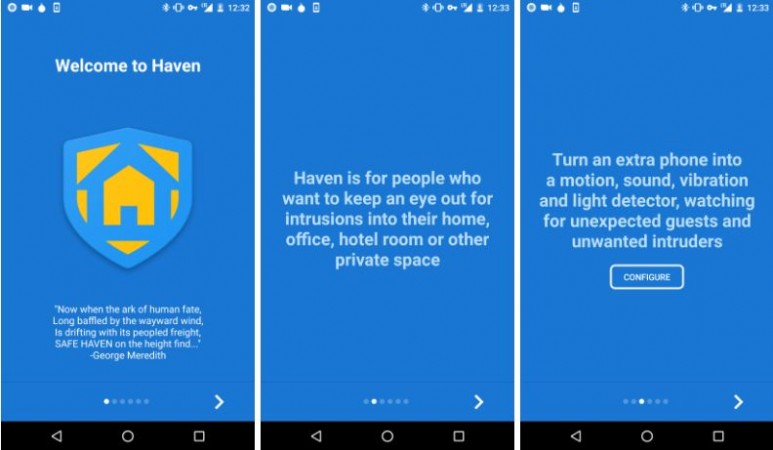
Edward Snowden has been working on an app, which claims to use the same technology used by the NSA to spy on you, to defend yourself against spies.
Haven is an open source Android app that deploys your phone’s numerous sensors (which includes your motion detector, light-detector, front and back cameras and microphone) to act as your personal spy or counter-intelligence operative; watching and waiting for any change in the environment, logging events for your eyes only.
The first version has been released publicly and is available for download on the Play Store. To use Haven though, one needs two phones and two numbers at least.
Theoretically, you could place a phone with Haven installed on it in your darkened room. The phone would monitor its surroundings and notify you in real time if it detects a change in lighting via its light sensor. It would notify you if someone picked up the phone, the motion detected by the phone’s accelerometer.
It could even send you a picture of your uninvited guest’s face with one of the cameras and detect and record his voice should he be the sort of person who self-narrates his heists. You could set up Haven to send you encrypted notifications so that nobody else would find out about your sedentary spy. Or, it could be configured to send you a text message instead.
The use of this app isn’t merely confined to those who live in the world of subterfuge and counter-espionage; it serves up some practical applications for regular people as well.
“I can imagine this might be useful to victims of domestic abuse who are worried about their abusers spying on them in some way,” Eva Galperin, director of cybersecurity for Electronic Frontier Foundation, told the Intercept. “This might be useful for teenagers who are concerned about their parents, or who are concerned about nosy partners, or friends [spying on them]. Or if you’re in college and you’re worried about your roommate.”
Interestingly one can imagine that both concerned parents and independent teenagers are going to find a use for this app. However, she notes that the app has the potential to feed a person’s paranoia:
“If you’re concerned about people coming into the room and moving things, it doesn’t necessarily mean that they have ill intent. Or you could be setting things up on a hair trigger, and then you end up with a bunch of false positives and get paranoid for no reason.”






What about Apple users?